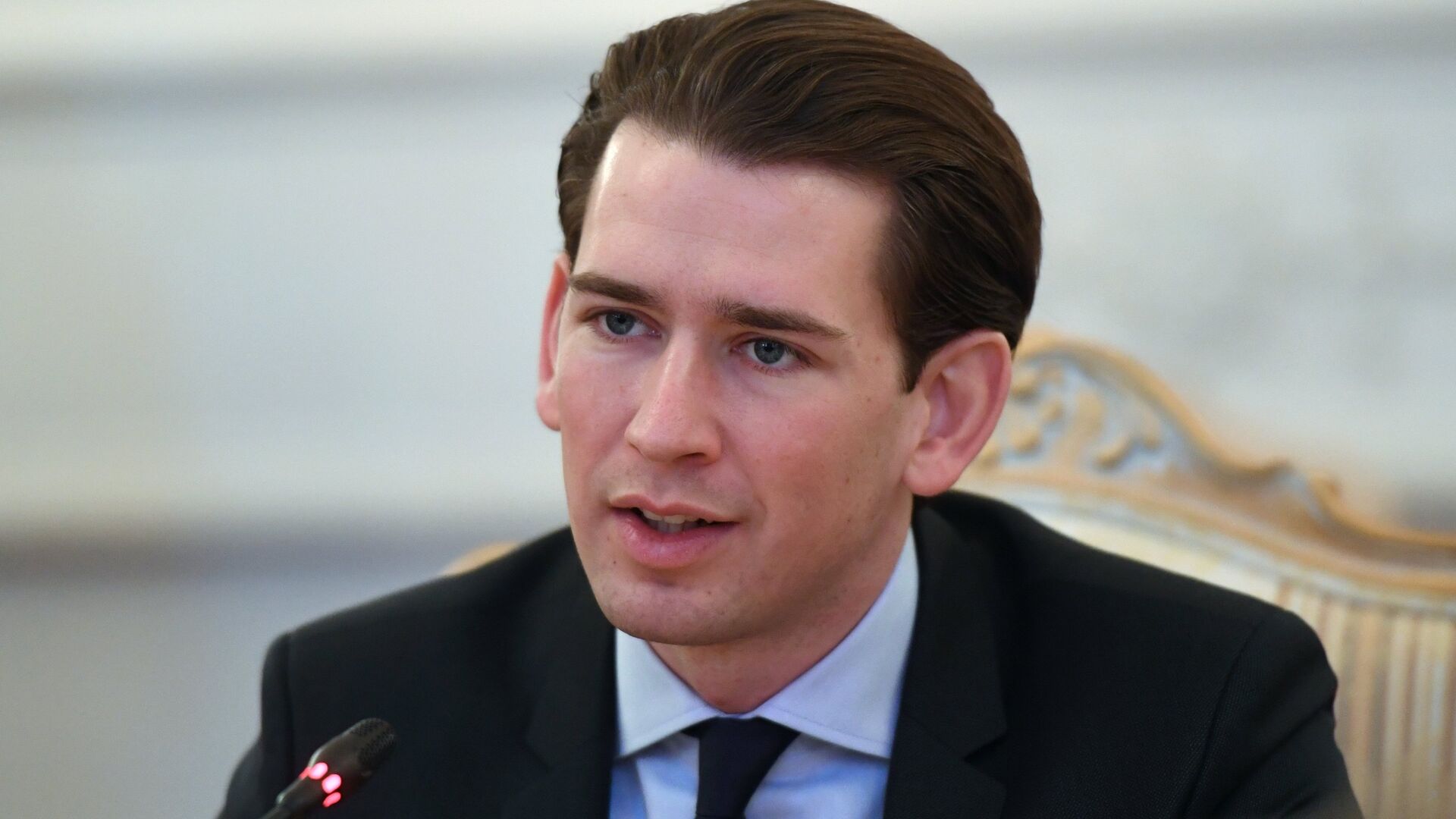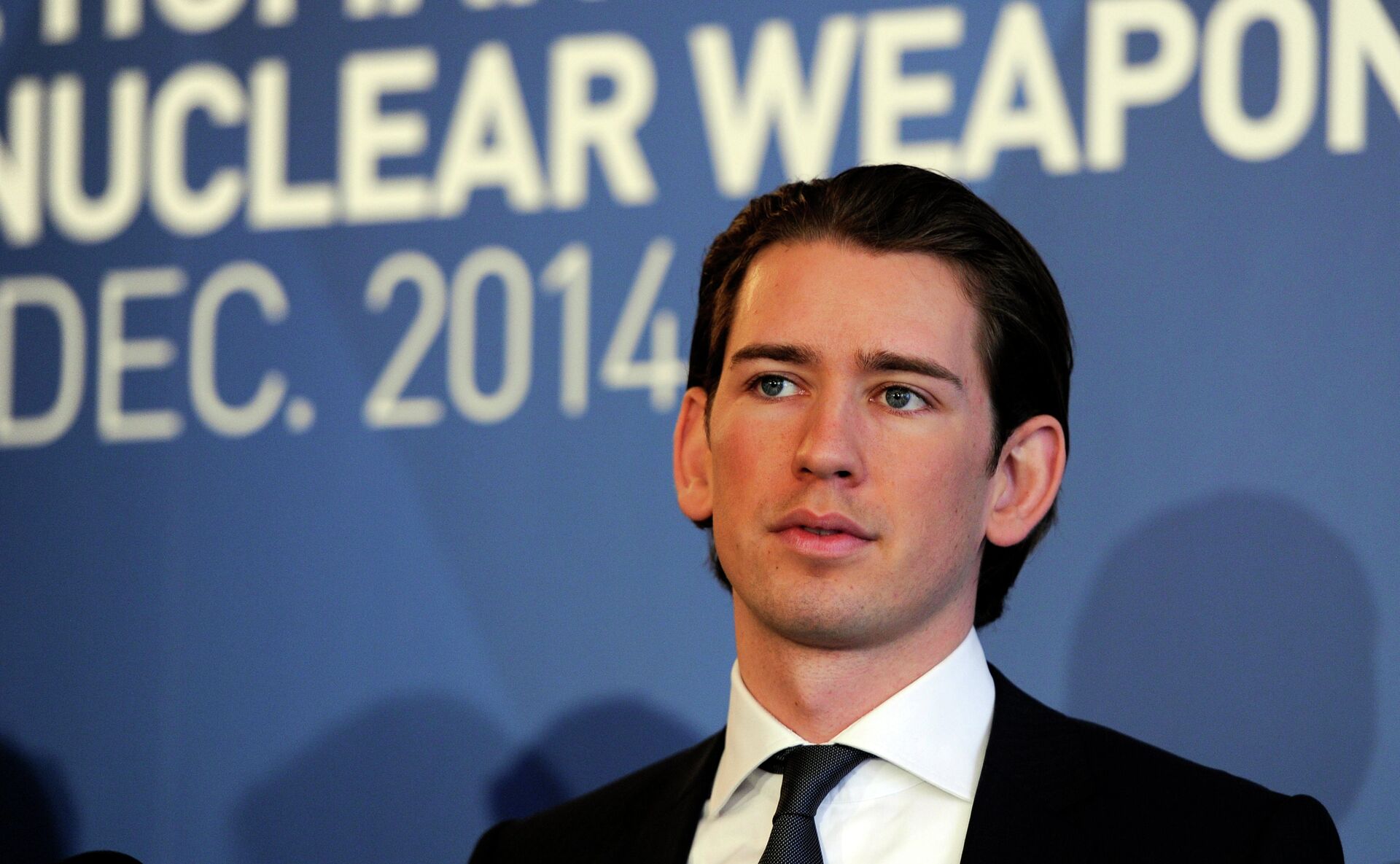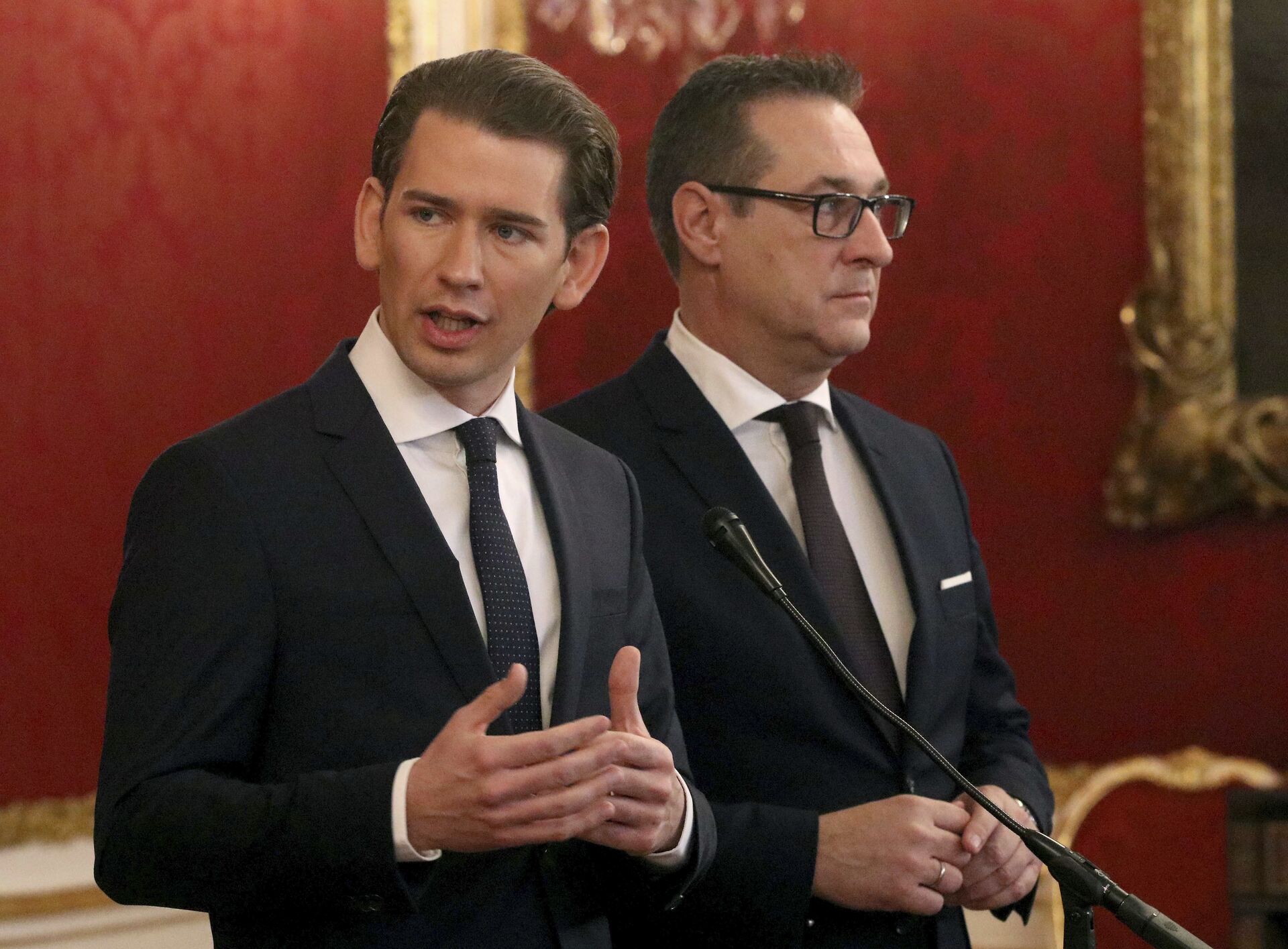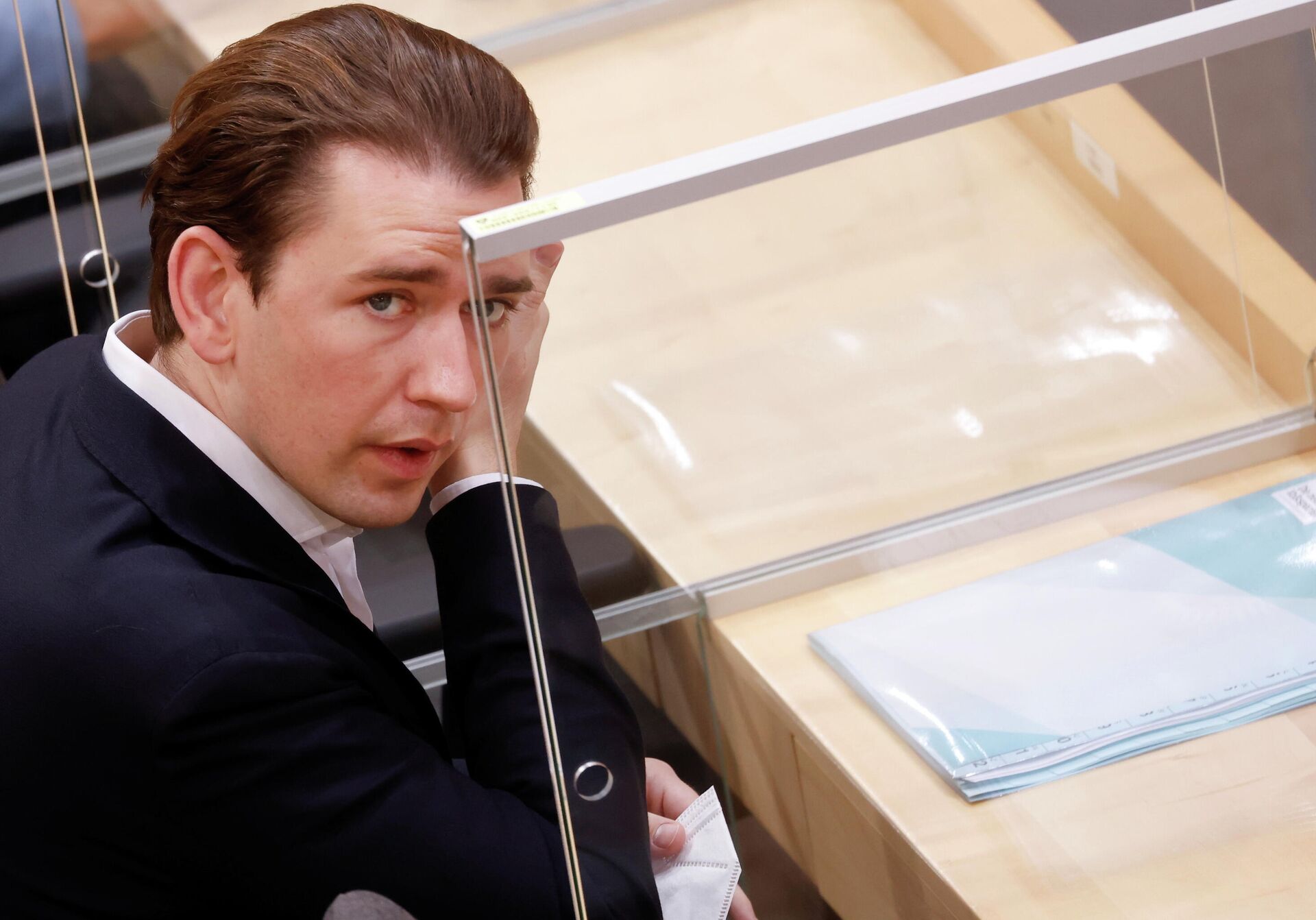Sebastian Kurz: Tumultous Career From Political Wunderkind to Bribery, Corruption Probes

© Sputnik / Evegeni Bijatow
/ Subscribe
Sebastian Kurz resigned as Austrian chancellor on 9 October amid an investigation by the anti-corruption prosecutor's office into him. Vehemently denying allegations and vowing to prove his innocence, he remained the head of the Austrian People's Party and the leader of its parliamentary faction.
Ex-Austrian chancellor Sebastian Kurz announced on Thursday he was quitting politics for good.
"It's a new chapter in my life that opens today," Kurz told reporters in Vienna, emphasising he hoped to devote more time to his family.
As he announced he would hand over the office of party chairman of the Austrian People's Party (ÖVP) as well as the parliamentary group leader, Kurz admitted that the decision didn’t come easily for him. Addressing the corruption allegations against him that contributed to the move he said:
"I look forward to the day when I can prove in court that the charges against me are untrue."
Kurz acknowledged that he was “neither a saint, nor a criminal, but a man with strengths and weaknesses." The 35-year-old politician who is potentially facing a corruption probe after parliament lifted his immunity on 18 November has been insisting that he does not consider himself guilty. Having vowed to prove his innocence, which he claimed had been confirmed by an independent legal examination, he touted the move to remove his immunity as offering him a means of fighting the "false" claims.
Here is a look at how the politician credited with a meteoric rise in politics fell from grace in the aftermath of pernicious scandals.
Political Prodigy
Sebastian Kurz, who became Austria’s Foreign Minister when he was just 27, and took over as Chancellor by the age of 31, boasted a lightning-swift political career. Born in Vienna on 27 August 1986, Kurtz, who attended law school at the University of Vienna but subsequently dropped out to focus on his political career, joined the Young People's Party (JVP) in 2003.
His trailblazer political post came five years later as chairman of the JVP in Vienna. A cabinet reshuffle in 2011 resulted in the 25-year old being appointment as State Secretary of the Interior Ministry for Social Integration.

Austria's Minister for Foreign Affairs and Integration Sebastian Kurz speaks at the International conference on the humanitarian impact of nuclear weapons, on December 8, 2014 in Vienna
© AFP 2023 / SAMUEL KUBANI
Kurz became Austria’s Foreign Minister at 27 in the wake of the 2013 legislative election, remaining on the post until December 2017. When Vice Chancellor Reinhold Mitterlehner resigned as chairman of the Austrian People’s Party (OVP) in May 2017, Sebastian Kurz, tipped as his successor, was officially elected chairman of the party by the Bundesparteitag (federal party conference) on 1 July 2017.
Kurz participated as the top candidate of the OVP in the 2017 legislative election. Charged with forming his first cabinet, he entered a coalition with the Freedom Party of Austria (FPO). Sebastian Kurz was twice Chancellor of Austria, initially from December 2017 to May 2019 and then again from January 2020 to October 2021.
‘Ibiza Affair’
Sebastian Kurz’s first year in chancellorship was marred by the Ibiza scandal and the demise of the OVP-FPO coalition. The Ibiza affair erupted after secretly recorded video showed then-vice chancellor and FPO leader Heinz-Christian Strache discussing awarding government contracts in exchange for favorable news coverage of the party. Strache was forced to resign in its wake.

Foreign Minister and leader of the Austrian People's Party, OEVP, Sebastian Kurz, left, and Heinz-Christian Strache, chairman of the right-wing Freedom Party, FPOE, talk to press after talks with Austrian President Alexander van der Bellen at the Hofburg palace in Vienna, Austria, Saturday, Dec. 16, 2017
© AP Photo / Ronald Zak
Kurz has been accused of making false testimony to a parliamentary commission at the time of the “Ibiza affair.” Questioned over appointments to posts at state-owned companies, Sebastian Kurz denied under oath in 2020 being involved in the appointment of conservative Thomas Schmid as chief executive of OBAG state-run holding a year earlier.
Subsequent text messages seen by the commission showed Kurz confirming to Schmid that he could get anything he wanted.
The scandal involving Kurz’s former coalition partner FPO led to the collapse his previous government in 2019. While the National Council ousted the Austrian politician through a motion of no confidence, after the 2019 legislative election, he returned to power, forming a brand-new coalition with the environmentalist Green Party.
Media Bribery Probe
On 6 October 2021, Austrian anti-corruption prosecutors conducted a raid on the offices of Federal Chancellor Sebastian Kurz as he and nine other politicians and newspaper executives found themselves in the crosshairs over embezzlement and media bribery accusations. Those implicated in the scandal are suspected of dipping into state coffers to pay for “tainted”, laudatory opinion polls and positive media coverage.
“Resources from the Finance Ministry were used to finance partially manipulated opinion polls that served an exclusively party political interest" between 2016 and 2018, stated prosecutors.
Funding was allegedly conducted through advertisements in the Osterreich newspaper on behalf of the Federal Ministry of Finance. The purported payments of “at least €300,000 ($347,000)” could result in lengthy jail terms if the suspects were to be convicted. Sebastian Kurz denied any wrongdoing.

Austria's former Chancellor Sebastian Kurz attends a session of the parliament in Vienna, Austria November 17, 2021
© REUTERS / LEONHARD FOEGER
Kurz resigned as Austrian chancellor on 9 October amid pressure over the anti-corruption probe by the prosecutor's office, while remaining as head of the party and the leader of its parliamentary faction. The anti-corruption prosecutor's office later in October sent a request to the Austrian National Council seeking to lift Kurz's parliamentary immunity. After his own Austrian People's Party backed the move, the Austrian National Council, the parliament's lower house, stripped the former chancellor of parliamentary immunity on 18 November.
